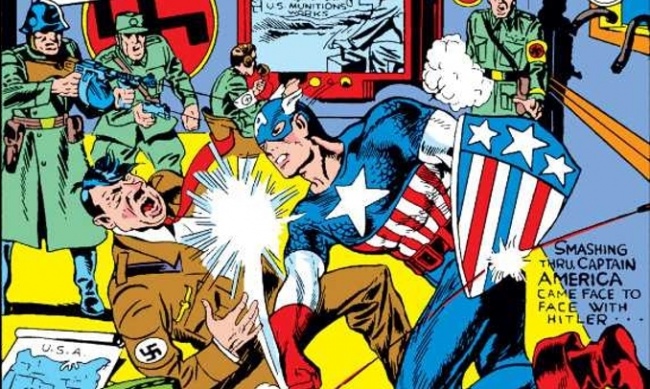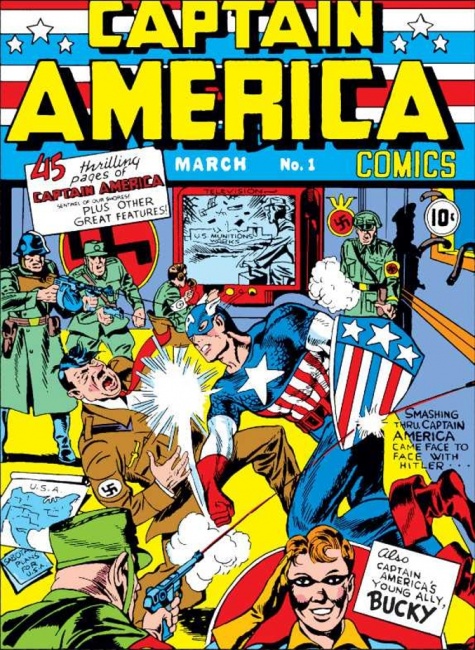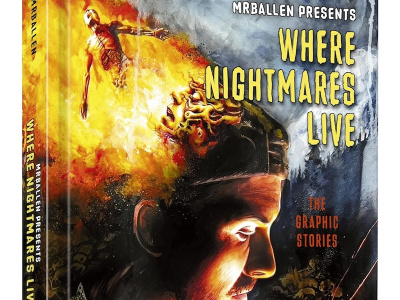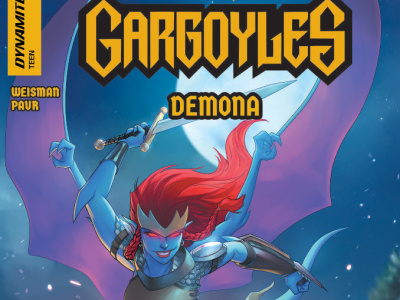Confessions of a Comic Book Guy is a weekly column by Steve Bennett of Super-Fly Comics and Games in Yellow Springs, Ohio. This week, Bennett looks at comics in a politicized time.
Two weeks ago I first wrote about the rumor reported on Bleeding Cool that Marvel would dial back the "political" content of its comics (see "Confessions of a Comic Book Guy--Everything Isn’t Political"). In spite of the fact it hasn’t been confirmed, there have been a number of opinion pieces commenting on it online with titles like "Marvel Might Be Letting Social Agendas Go," "Marvel To Depoliticize Its Comics After Social Justice Storytelling Experiment" and "X-Men Comics to Abandon Their 'Social Justice Warrior' Storyline."
Each used the word "social" instead of "politics" in their headlines because they didn’t mean politics, as in political parties, candidates or policies. They meant social politics, which are social issues about gender and racial inclusion and representation that have become politicized. In "Marvel Might Be Letting Social Agendas Go," Vinnie Penn wrote, "Don’t let social agendas motivate your stories. Allow the stories to tell themselves, and if socially relevant points come out organically, then so be it."
It’s a reasonable point, but it becomes problematic when he deals with specific comic book titles, like Ms. Marvel. Penn complains her stories are "bogged down with tireless lectures about exclusion, Islamophobia, and more." Penn is neither willing or able to understand how such issues would "come out organically" in her comics.
If he wants to understand, I’d advise he read "Why America Needs Marvel Superhero Kamala Khan Now More Than Ever" by Katie M. Logan, which can currently be found on over a dozen websites. In it, Logan writes how Ms. Marvel "challenges the assumptions many Americans have about Muslims and is a radical departure from how the media tend to depict Muslim-Americans. She shows how Muslim-Americans and immigrants are not forces that threaten communities."
In his piece, "Marvel Comics to Abandon Social Justice Storylines?" Tom Knighton makes another good point: "If you agree with the message in these comics, then you may not take any issue with what you're seeing lately from Marvel. However, for readers who are either neutral on these issues or disagree with the message, the comics portray them as the enemy. People don't want to spend their hard-earned money to be told how awful they are."
While I’ve enjoyed writer Nick Spencer's run on the Captain America titles, his work hasn't been exactly subtle. I know America has never been this politically polarized, but absolutely everyone on the opposite side of the issue of each issue has been a completely heartless bastard. As Knighton points out, "readers don’t like to be lectured to" or seen as "the enemy," and I can’t help but think there has to be a way of making your point without potentially alienating half your readers this way. Actually, I know that there is.
I’ve written about this before (see "Confessions of a Comic Book Guy--Torn From Yesterday’s Headlines") but back in the Bronze Age of socially relevant comics in Amazing Spider-Man #91-92, (by Stan Lee, Gil Kane and John Romita Sr.), Sam Bullit, a racist law-and-order demagogue with problem hair, is running for D.A., and because he promises to bring in Spider-Man he gets the endorsement of The Daily Bugle. But when some of his goons work over Peter Parker, J. Jonah Jameson’s eyes are opened just wide enough that editor Robbie Robinson is able to convince him of Bullit’s ties to hate groups.
In the end it isn’t superheroes who bring Bullit down by exposing him, but Jameson and Robinson working together. Jameson (a tough on crime white businessman who comes from money; I’ll assume he’s a conservative) doesn’t automatically reject the evidence as a “smear job” just because it comes from Robinson (a decidedly more liberal black man). Jameson doesn’t have an epiphany and become a liberal, but he does manage to look past his own interests, stick to his principles and do the right thing.
Finally, there is one problem with worrying too much about "readers who are either neutral on these issues or disagree." I know it seems like a decade ago, but remember earlier this month when all America seemed to be asking, "Is It OK to Punch a Nazi?" I had qualms (see "Confessions of a Comic Book Guy--Justice: More Than Just a Punch In The Mouth,") but the general consensus seemed to be not only was Nazi-punching OK, it was an All-American pastime. But back in 1941 when Captain America #1 came out with a cover showing Cap punching out Hitler it was controversial. Because it was a year before we entered WWII, a war that according to one poll 75% of Americans were against entering it, and Hitler was the leader of a foreign country.
If Timely Comics publisher Martin Goodman had worried about offending readers who were either "neutral" or "disagreed" with someone punching Hitler, where would comics be? Where would we be? And, for the record, I’m looking forward to when Captain America goes "back to basics:" it just doesn’t seem right to have the guy who started it all be benched when Nazi-Punching has never been more popular.
The opinions expressed in this column are solely those of the writer, and do not necessarily reflect the views of the editorial staff of ICv2.com.

Column by Steve Bennett
Posted by Steve Bennett on February 24, 2017 @ 3:14 pm CT
MORE COMICS
Ten Speed Graphic Fall 2025 Catalog
July 11, 2025
Ten Speed Graphic has released its Fall 2025 catalog.
From Dynamite Entertainment
July 11, 2025
Check out the preview for Gargoyles: Demona #1, published by Dynamite Entertainment.
MORE COLUMNS
Column by Scott Thorne
July 7, 2025
This week, columnist Scott Thorne looks at the effect of Diamond Comic Distributors' bankruptcy on the games industry.
Column by Rob Salkowitz
June 30, 2025
Columnist Rob Salkowitz talks to a mid-sized publisher who told him we are at "DEFCON 2, if not DEFCON 1."








